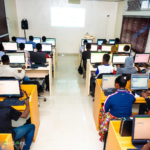2024 marked the end of Gen Alpha, the cohort that succeeded Gen-Z. Beginning in 2025, all children born until 2039 will fall into a new cohort known as Generation Beta.
Children of older members of Gen Z, this generation is expected to redefine societal norms as they grow up in a world driven by unprecedented technological, environmental and social transformations.
Generation Beta will grow up in a world that feels the full weight of climate change, rapid technological advancements in artificial intelligence (AI) and shifting social paradigms.
Unlike previous generations, Gen Beta’s formative years are predicted to be entirely dominated by automation and a pressing need for sustainable innovation.
While Gen Z and Alpha were the first to grow up in the digital age, Gen Beta will live in a world where AI is fully integrated into everyday life. From AI tutors personalised to their learning styles to autonomous transportation systems, their experiences will be shaped by a level of technological assistance previously unimaginable.
Their relationship with technology is likely to be intuitive, as AI and robotics will be as commonplace as smartphones are today.
At the same time, Gen Beta will inherit a planet grappling with the consequences of global warming, making climate awareness a central theme of their lives. Environmental sustainability won’t just be a concept taught in school—it will underpin every aspect of their daily lives, from the energy powering their homes to the food they consume.
Similarly, with advances in virtual reality (VR) and augmented reality (AR), Gen Beta will experience an unprecedented level of interconnectedness. However, this hyperconnectivity will coexist with the rise of personalised virtual environments, allowing individuals to tailor their digital worlds to their unique preferences.
Education for Gen Beta will likely be heavily gamified, with AI-driven platforms providing tailored learning experiences. Traditional classroom structures may give way to hybrid models that leverage virtual spaces and project-based learning. Similarly, the concept of work will evolve, with automation handling routine tasks and humans focusing on creative, emotional, and complex problem-solving skills.
Despite the promise of technological advancements, Gen Beta will face unique challenges. The constant interplay between real and virtual environments could exacerbate feelings of isolation or anxiety, even as it fosters global connections. Striking a balance between screen time and real-world interactions will be critical.
“A major downside would be that they won’t have a clue about what the world was like without the Internet, AI, smartphones and computers,” says Luke Olaniyi, a public-affairs analyst.
Additionally, Gen Beta may find themselves in a world grappling with wealth disparity and the socio-economic consequences of rapid automation, as “parents would need to work extra hard to expose them to some kind of struggle,” Olaniyi adds.
However, Gen Beta holds immense potential to shape a brighter future. Their upbringing amidst AI-driven problem-solving and sustainability-focused education will position them as leaders in creating solutions for global challenges. Businesses, educators, and policymakers have a responsibility to equip this generation with the tools to thrive in an uncertain world.
Early education on digital ethics and AI will empower them to harness technology responsibly, ensuring it is used to uplift humanity rather than deepen divides. By bridging generational and cultural divides, Gen Beta can use their hyperconnected upbringing to build more inclusive societies.
Virtual collaboration tools will enable them to work across borders, fostering global solutions to shared problems. With climate consciousness deeply ingrained, they could be at the forefront of lifestyle changes and policy advocacy that prioritise environmental stewardship.
Generation Beta is poised to grow up in an era of rapid transformation and immense challenges, but also unparalleled opportunities. Shaped by AI, climate urgency, and shifting social norms, this cohort has the potential to redefine how humanity lives, works, and interacts.
As the first babies of Gen Beta begin to arrive, we are only beginning to glimpse the world they will inherit—and create.
Generation Beta, starting in 2025 and spanning until 2039, will be characterized by profound technological, environmental, and social changes. As children of older Gen Z individuals, Gen Beta will grow up in an era dominated by artificial intelligence and automation, with AI deeply embedded in daily life and education. Technological familiarity will be inherent as AI and robotics become as routine as smartphones. Environmental sustainability will be a pivotal aspect of their lives, with climate awareness integrated into everyday activities, from energy use to consumption habits.
Education for Gen Beta will shift towards AI-driven, gamified, and hybrid learning models, focusing on creativity and problem-solving as automation manages routine tasks. Despite the potential of technology to create connections, Gen Beta might face challenges like isolation without careful balance between virtual and real-world interactions. Economic disparities and the effects of rapid automation will also present challenges, prompting educators and policymakers to provide tools for success.
Gen Beta is expected to lead in addressing global issues through their upbringing in AI-driven problem-solving and sustainability-focused education. They will likely champion digital ethics, work collaboratively across borders, and promote environmental stewardship, ultimately fostering inclusive societies and lifestyles centered on sustainability. With unique opportunities ahead, Gen Beta holds potential to redefine humanity's interaction with the world, paving the way for a future shaped by rapid transformation and global cooperation.






